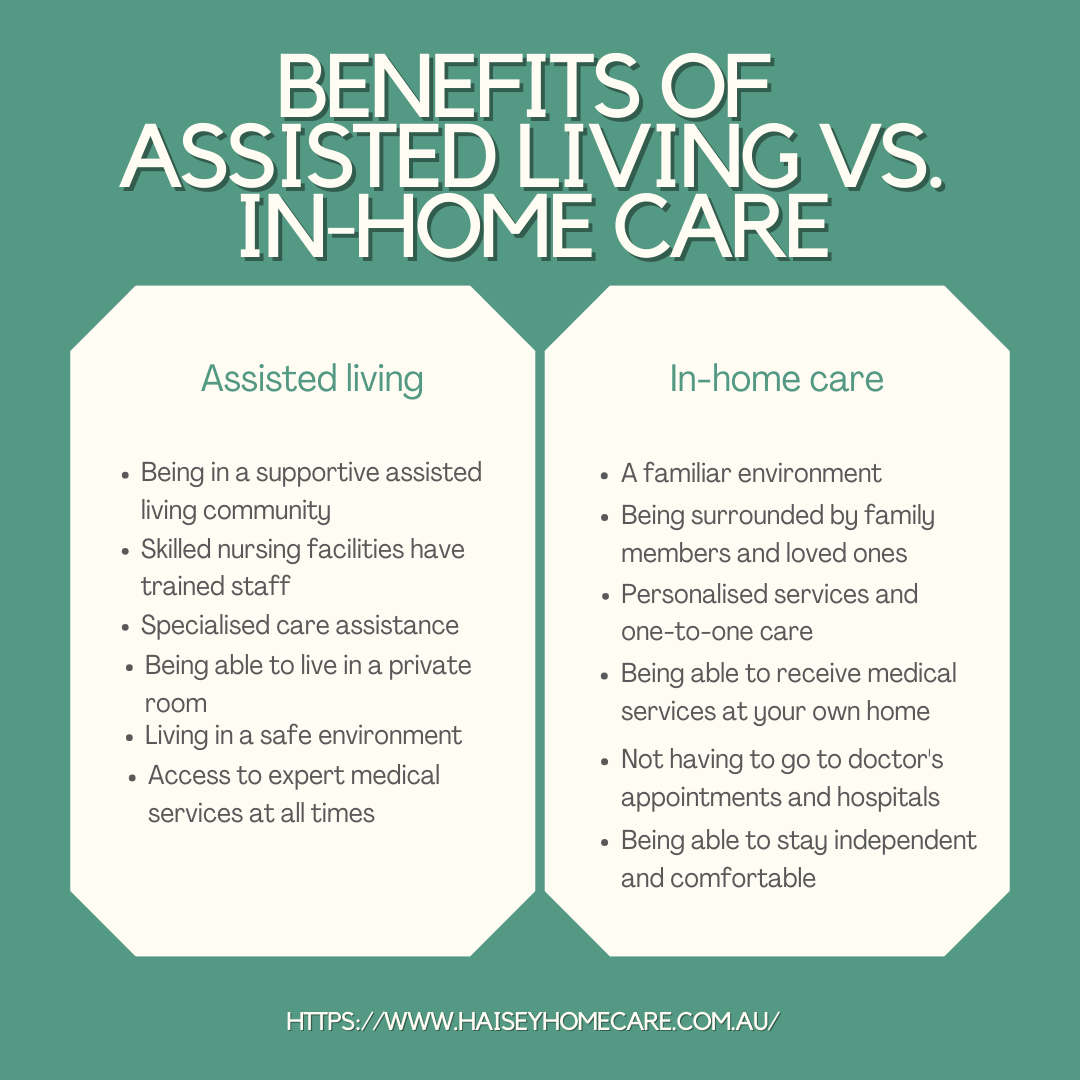By
Haisey Home Care
Updated on: October 16, 2023
•
x min read
What is the best solution for a patient with dementia: dementia home care vs. assisted living? This article will help you figure out how to help your loved one.
.jpg)
Summary:
People with dementia usually have complex, ongoing care needs. In later stages, family members are often unable to take care of their loved ones.
When the time comes, they have to make the decision to get some help. They can send them to a memory care facility or hire in-home caregivers.
There are many benefits to both options. Depending on their needs, the patient may be better off with one or the other.
In this "dementia home care vs. assisted living" article, we'll talk about these two options. We'll also explain the key differences between these two senior living solutions.
Assisted living facilities are also called nursing homes. In some cases, they're called memory care facilities. They aren't only for elderly patients but for people experiencing cognitive impairment.
These include people with dementia, Alzheimer's disease, and other cognitive conditions.
Memory care facilities usually offer:
The exact services and amenities vary depending on the facility.
Even though nursing homes aren't your real home, they can be the best next thing. Some patients don't have anyone who can take care of them anymore. So, a memory care facility is their only option.
Nursing home residents can receive the care they need here. Their quality of life can improve greatly in residential care.

In-home care allows the patient to remain living at home. Elderly people can receive the care they need in the comfort of their own homes.
In-home care usually includes the following care services:
You can receive in-home care through Home Care Packages. These are aged care services funded by the Australian Government.
Older adults can apply for a Home Care Package with or without dementia. Any elderly person who needs help with day-to-day tasks has the right to apply.
They are then free to choose their home care provider.
Home Care Packages also let you apply for dementia supplements.

Patients can receive dementia care both at home and at an assisted living facility.
If the patient is in the early stages of dementia, they can stay home. They can receive in-home care with the help of family members.
Those at later stages have an increased risk of injury. They can't afford to live in an unsafe environment.
These patients usually fall under Level 4 of home care. This is the highest Home Care Package level.
If you're not sure what to do, ask yourself these questions:
It's a good idea to talk to a professional. Your doctor can tell you which option is better for your loved one.
In some cases, they have no other option than to go to a nursing home. But you can also receive home care if you have a dementia diagnosis.
Many families decide they want to continue living with the dementia patient. If the patient has a mild or moderate case of dementia, all their needs can be met at home.
Here are some benefits of in-home care for dementia patients:
The whole point of in-home care is to make staying home possible for the patient. If they need help with daily living, that's what the in-home caregivers are there for.
A familiar environment is very important for memory loss. Moving to a nursing home can make the dementia patient disoriented and scared.
If they are surrounded by loved ones, they'll find the treatment much easier. It also helps that they can get the care and therapy they need at home.
Being able to stay independent also helps with the patient's mental health.
In some cases, the patient may not want to live in a nursing facility. Even though memory care communities can be good for them, they might not want this option.
It's important to put their needs and preferences first.
Many seniors choose to live in an assisted living facility. That's because family caregivers can't take care of them for some reason.
The dementia patient may not have anyone to look after them as well. If that's the case, nursing homes are their only option.
Here are the most important benefits of assisted living for dementia care:
Assisted living communities can help the patient get used to their new home. They are surrounded by those who are experiencing similar health issues.
They also have the support of trained staff, nurses, and doctors. This is especially important for Alzheimer's disease and dementia care.
As the disease progresses, the patient needs to be monitored more often. Nursing homes offer non-stop monitoring and a safe environment.

There are many benefits of assisted living communities. But dementia patients can also receive the care they need at home.
Haisey Home Care is here to help patients with dementia. Our dementia care program is for those with mild, moderate, and advanced dementia. We can make life easier for the patient and their family members.
If you are interested in our services, feel free to contact us. Book a free in-person consultation if you want to know what your options are.
Chat with us to learn more about how we can help you. Book in a free, no obligation in-home consultation.
